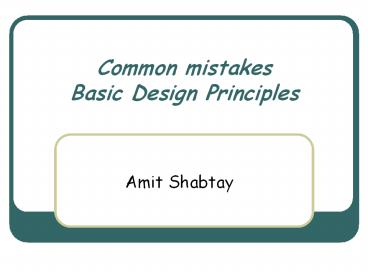Common mistakes Basic Design Principles - PowerPoint PPT Presentation
Title:
Common mistakes Basic Design Principles
Description:
Exercise previews and reviews. March 3rd, 2004. Object Oriented Design Course. 3 ... Car getCar(); void setCar(Car car); What do we see ? March 3rd, 2004 ... – PowerPoint PPT presentation
Number of Views:52
Avg rating:3.0/5.0
Title: Common mistakes Basic Design Principles
1
Common mistakesBasic Design Principles
- Amit Shabtay
2
Tirgul Summery
- Basic design principles
- Advanced design principles (LSP, )
- Intro to eclipse, unit testing, JUnit
- Generic programming (STL, Java generics)
- AspectWerkz- AOP framework
- ODBC,JDBC
- Exercise previews and reviews
3
Course Requirement
- Basic understanding of OOD
- Basic knowledge of C, Java
- 3 programming exercises
- 2 theoretical exercises
- Exam
4
Basic Design Principles
5
Common Mistakes
- Repeated often
- Especially with the inexperienced
- Dont you make them!
- How to recognize the danger signals?
6
Danger Signals (1)
- public class Counter
- public int howManyA(String s)
- int conut 0
- for(int i 0 i lt s.length() i)
- if(s.charAt(i) 'a')
- count
- return count
- Is this a class?
7
Danger Signals (2)
- Class City extends Place
- Class Jerusalem extends City implements Capital
- Class TelAviv extends City
- What is wrong here?
8
Danger Signals (3)
- Class Person
- String getName() void setName(String name)
- int getAge() void setAge(int age)
- Car getCar() void setCar(Car car)
- What do we see ?
9
Basic Design Principles
- The Open Closed Principle
- The Dependency Inversion Principle
- The Interface Segregation Principle
- The Acyclic Dependencies Principle
- These principles and more
- http//www.codeguru.com/forum/showpost.php?p1092
794postcount1
10
The Open Closed Principle
- Software entities (classes, modules, functions,
etc.) should be open for extension, but closed
for modification. - Existing code should not be changed new
features can be added using inheritance or
composition. - Which is preferred?
11
Example
- enum ShapeType circle, square
- struct Shape
- ShapeType _type
- struct Circle
- ShapeType _type
- double _radius
- Point _center
- struct Square
- ShapeType _type
- double _side
- Point _topLeft
- void DrawSquare(struct Square)
- void DrawCircle(struct Circle)
12
Example (cont.)
- void DrawAllShapes(struct Shape list, int n)
- int i
- for (i0 iltn i)
- struct Shape s listi
- switch (s-gt_type)
- case square
- DrawSquare((struct Square)s)
- break
- case circle
- DrawCircle((struct Circle)s)
- break
Where is the violation?
13
Correct Form
- class Shape
- public
- virtual void Draw() const 0
- class Square public Shape
- public
- virtual void Draw() const
- class Circle public Shape
- public
- virtual void Draw() const
void DrawAllShapes(SetltShapegt list) for
(IteratorltShapegti(list) i i) (i)-gtDraw()
14
The Dependency Inversion Principle
- High level modules should not depend upon low
level modules. Both should depend upon
abstractions. - Abstractions should not depend upon details.
Details should depend upon abstractions.
15
Example
Where is the violation?
- void Copy()
- int c
- while ((c ReadKeyboard()) ! EOF)
- WritePrinter(c)
16
Example (cont.)
- Now we have a second writing device disk
- enum OutputDevice printer, disk
- void Copy(outputDevice dev)
- int c
- while ((c ReadKeyboard()) ! EOF)
- if (dev printer)
- WritePrinter(c)
- else
- WriteDisk(c)
17
Correct form
- class Reader
- public
- virtual int Read() 0
- class Writer
- public
- virtual void Write(char)0
- void Copy(Reader r,
- Writer w)
- int c
- while((cr.Read()) ! EOF)
- w.Write(c)
18
The Interface Segregation Principle
- The dependency of one class to another one should
depend on the smallest possible interface. - Avoid fat interfaces
- Example Word toolbars
19
The Interface Segregation Principle
20
The Interface Segregation Principle
21
Example
class TimerClient public virtual void
TimeOut() 0
class Timer public void Regsiter(int
timeout, TimerClient client)
- class Door
- public
- virtual void Lock() 0
- virtual void Unlock() 0
- virtual bool IsDoorOpen() 0
22
A Timed Door
A violation?
23
Correct Form
- Two options
In which language?
?
Adapter
Multiple Inheiritence
24
The Acyclic Dependencies Principle
- The dependency structure between packages must
not contain cyclic dependencies.
25
Example
26
Correct Form
27
The Law Of Demeter
- Only talk to your immediate friends.
- In other words
- You can play with yourself. (this.method())
- You can play with your own toys (but you can't
take them apart). (field.method(), field.getX()) - You can play with toys that were given to you.
(arg.method()) - And you can play with toys you've made yourself.
(A a new A() a.method())
28
Example
29
How to correct
30
Example Code
31
Resources
- A nice resources page for OOD
- http//www.objectmentor.com
- About the principles (same site)
- http//www.objectmentor.com/mentoring/OOPrinciples
32
Package cohesion
- The Common Closure Principle
- Classes within a released component should share
common closure. That is, if one needs to be
changed, they all are likely to need to be
changed. - The Common Reuse Principle
- The classes in a package are reused together. If
you reuse one of the classes in a package, you
reuse them all.































